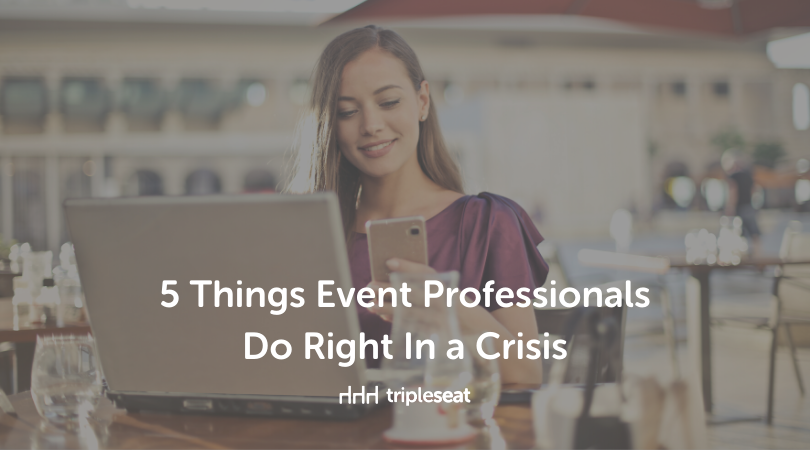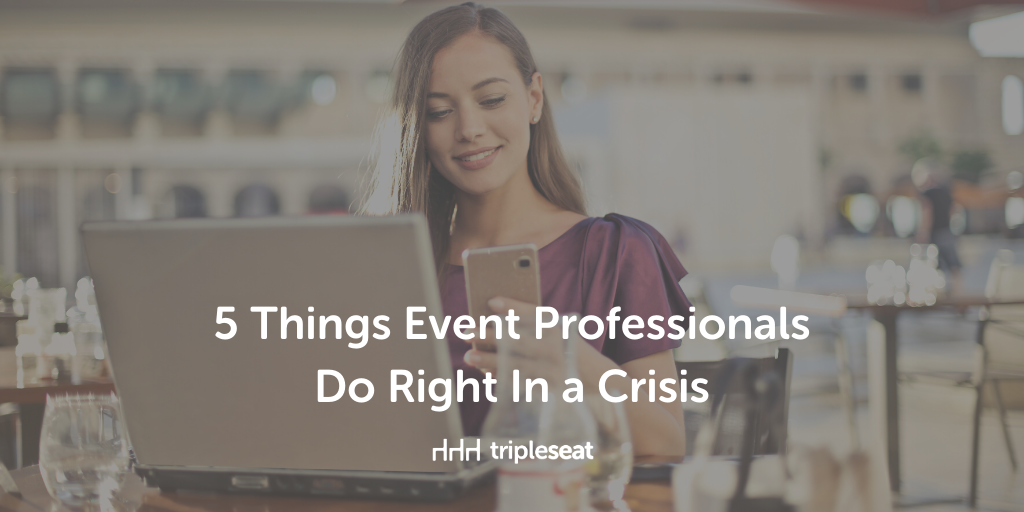5 Things Event Professionals Do Right In a Crisis

As an event planner, I’ve been dealt a few curveballs in my career — from having to switch event venues due to double bookings to canceling events when Hurricane Harvey flooded Houston and then again two weeks later when Hurricane Irma hit Miami (2017 was a rough year), and everything in between, including canceling events during the coronavirus pandemic. While some crises are bigger than others, all require a few deep breaths (maybe a quick cry), a few (or a lot) of drinks, and finally adapting to the circumstances.
Whatever the crisis, my biggest ally in managing the problem smoothly has always been the relationships I’ve had with my venue event manager. It is so important to create relationships with your clients early on, but even more so when your whole event seems to be falling apart. There are a few actions I’ve always appreciated from those who have helped support me in dealing with any crisis and have helped to build lasting relationships. It can be what ensures repeat business or even referrals for future bookings.
These are the top five things that event professionals should do in a crisis to maintain a good relationship with clients:
1. Communicate
While communication is an obvious first step in a crisis, I’ve had experiences where communication was handled very poorly, like when I found out a venue I was in the middle of contracting with actually wouldn’t be open for the dates of my event due to flooding — and the news did not come from my event sales manager!
As a client, I always appreciate a venue reaching out and communicating what the situation is, and a foreseeable timeline of what’s to be expected. In early March, I had to cancel and postpone some future events for Tripleseat due to the coronavirus pandemic. During that time period, it was important for me to receive daily updates of how our event venues were handling the situation so that I could help my team make informed decisions on moving forward with our events or postponing them.
Even if it’s just a quick check-in letting me know how everything is unfolding on their side, I appreciate updates from event managers because they give me a chance to share with them how the situation is being handled on my end. It keeps us both honest and realistic about the next steps.
2. Pick up the phone
In any crisis, there are tough conversations that need to be had — and trust me, the best way to do these is over the phone. Human interaction is more important than ever, and a phone call goes a long way. Anytime I’ve had an issue I needed to discuss with an event manager, the phone was the fastest and easiest way to get it solved. If a circumstance out of your control is impacting your private events business, the best way to deliver that news is a quick phone call. It helps you to relate with clients on a personal level and you can convey that the situation sucks and we’re all just trying to do the best we can.
And, in times like now, where we all have more free time, a phone in our hands, and a desperate need for some socialization, a phone call is a great way to stay connected and establish relationships. You don’t even need to talk about business; just check in and find out how everyone is coping
3. Be honest
I’ve always appreciated upfront and honest information, especially when navigating a crisis. And I would say it goes both ways. I want to give you the most transparency into what I think we should do in the situation, and I want the same transparency into what we can do. The more honest we are with each other, the more likely we are going to come to a solution that works for both of us. In the example of the flooded venue I was contracting — if the sales manager had just been upfront and honest about the condition and referred me to another venue, I’d have been much more likely to trust that person to bring business back when the venue was ready.
4. Be flexible
Plans change, especially during a crisis, which means our original agreement may need to change too. The more that you are willing to be flexible and get creative with me, the more likely I am to recommend your venue to an industry friend and bring more of my business to you. I’ve worked with enough people to know that being flexible and accommodating aren’t always common; we all have goals we need to meet. But, if during a crisis you are willing to work with me, especially if I feel like you are really doing me a favor, I will value that more than you know! All we want as clients is to feel like you are working with us, not against us.
5. Respond quickly
In a crisis, whether it’s hurricanes or a pandemic, information seems to be coming at us and changing quickly, which makes it hard to respond with definite answers to questions your clients may be asking you. Every time I reach out with a question, a response is always appreciated even if you don’t know the answer. I can live with a “We’re unsure at this time” answer over radio silence. Being transparent helps instill trust and reassurance that you are giving us all the information you have at any given time. Just know that when I write “Thanks for your timely and quick response,” I really mean it!
We’re all in this together
Tripleseat has created a Social Hour series, which is a weekly virtual roundtable for event professionals to meet and discuss the biggest issues their industry is facing right now. Join us for our next Social Hour, Things Event Planners Should Do to Prepare Business Post-Coronavirus, on Thursday, April 16 at 3:30 pm.
We’re also continuing to provide tips for the hospitality industry on our blog. We also have a weekly webinar, Adapting Your Business to Change, which includes ideas on how to grow revenue during this uncertain time and Tripleseat tools you can use to stay ahead of the game. And join our Facebook group, Event Manager Community, to connect with peers and discuss the impact of the coronavirus on the events industry.


